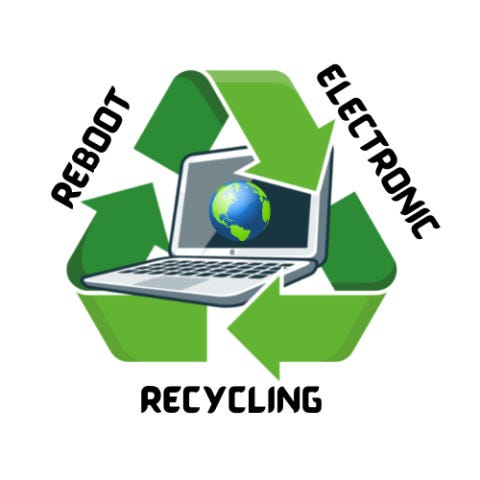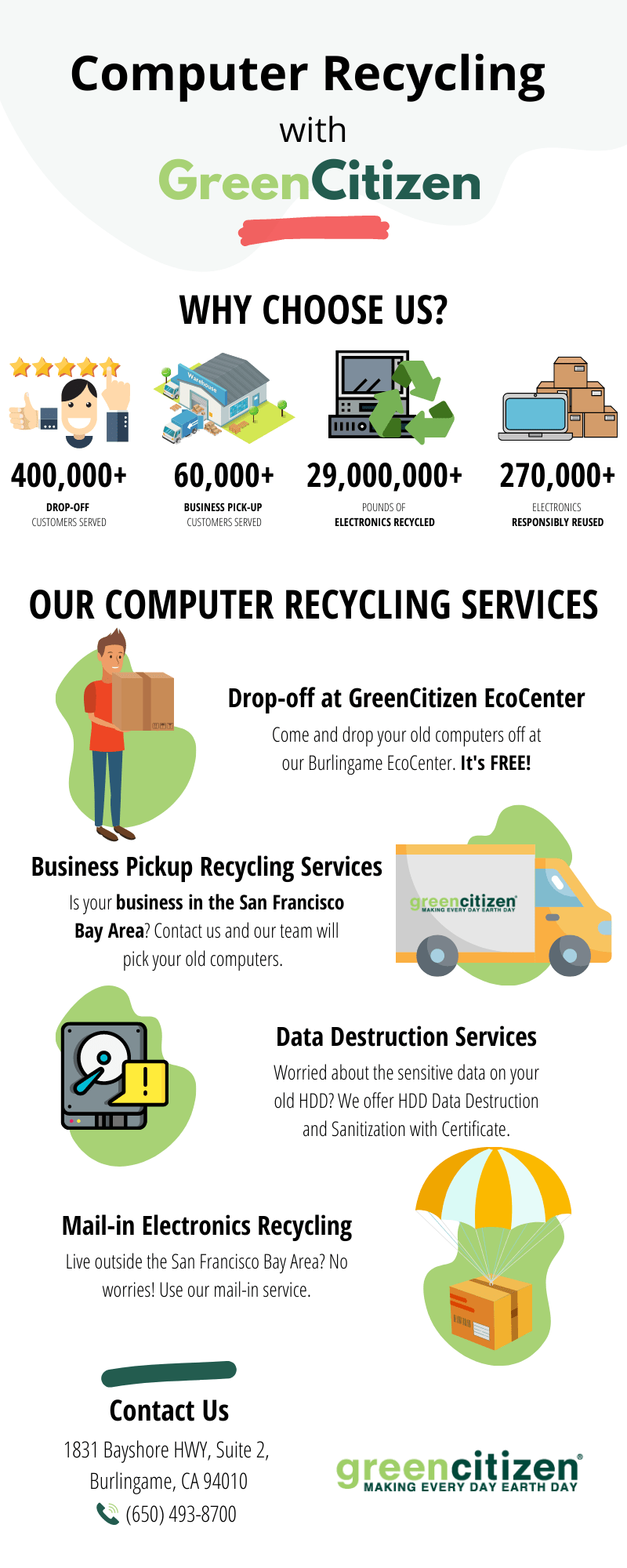Sustainable Solutions: Accept Eco-Friendly Computer Recycling Providers
Wiki Article
Lasting IT Solutions: Trustworthy Computer System Recycling Services
As innovation proceeds to progress at a rapid speed, the problem of digital waste, or e-waste, has become a pressing issue for both companies and people alike. The inappropriate disposal of computers and other electronic gadgets not only adds to ecological destruction, but additionally positions considerable threats to human health. Due to this, the demand for trustworthy computer recycling services has actually never ever been even more paramount. In this discussion, we will explore the environmental impact of e-waste, the benefits of responsible computer recycling, how to choose a trustworthy recycling service, the recycling procedure for computer systems and digital gadgets, and the function of government guidelines in e-waste administration. Join us as we discover the sustainable IT services that can help us navigate the intricacies of digital waste in a trusted and liable fashion.The Environmental Influence of E-Waste
The incorrect disposal of electronic waste, generally recognized as e-waste, has considerable environmental effects. E-waste describes discarded digital devices such as tvs, mobile phones, and computer systems (computer recycling). These tools contain harmful materials such as lead, mercury, cadmium, and brominated fire retardants, which can be unsafe to both human health and wellness and the setting if not effectively managedWhen e-waste is poorly dealt with, it usually ends up in land fills or is incinerated, releasing poisonous substances right into the water, dirt, and air. The launch of these dangerous products can contaminate groundwater, pollute the air, and add to dirt degradation, presenting serious health and wellness threats to nearby communities and ecological communities.
Furthermore, the incorrect disposal of e-waste additionally adds to the depletion of natural deposits. computer recycling. Several digital devices include valuable metals like gold, silver, and copper that can be recuperated and recycled if effectively reused. Nevertheless, when e-waste is not recycled, these important resources are lost, and the demand for new raw materials boosts, causing raised mining tasks and more ecological destruction.
To mitigate the ecological influence of e-waste, correct recycling and disposal techniques need to be utilized. This includes the responsible collection, taking down, and recycling of digital gadgets to recover valuable products and make certain the risk-free administration of dangerous substances. Applying efficient e-waste administration practices is crucial to protect the environment, save resources, and advertise a sustainable future.

Advantages of Accountable Computer Recycling
Effectively reusing computer systems uses a wide variety of advantages, including ecological preservation and resource preservation. Accountable computer system recycling not only aids avoid electronic waste from winding up in landfills, yet it likewise reduces the demand for resources and energy in the manufacturing of new gadgets.One of one of the most significant advantages of responsible computer system recycling is the preservation of the setting. When electronic waste is incorrectly dealt with, it can release harmful compounds such as lead, mercury, and cadmium right into the soil and water, posturing a risk to ecosystems and human health and wellness. By reusing computers, these unsafe materials can be safely extracted and taken care of, reducing the threat of pollution.
One more benefit is resource conservation. Computer systems have important products like gold, copper, light weight aluminum, and silver, which can be recuperated and reused with reusing procedures. By extracting and recycling these products, the demand for mining new sources is lowered, conserving natural deposits and lowering the ecological impact of resource extraction.
Moreover, liable computer system reusing helps to reduce energy usage. Manufacturing new computers needs a substantial quantity of power, from the removal of raw products to the setting up procedure. By reusing computer systems and recycling their parts, the energy-intensive production procedure can be stayed clear of, bring about a decrease in greenhouse gas exhausts and an extra lasting usage of power sources.
Just How to Pick a Trustworthy Computer System Recycling Solution
When selecting a computer system reusing solution, it is necessary to consider a couple of vital variables to ensure that you pick a trustworthy and reliable provider. Firstly, it is crucial to validate if the reusing service follows proper ecological guidelines and methods. A reliable company will have certifications and certifications that show their commitment to liable recycling. Search for certifications such as R2 (Liable Recycling) or e-Stewards, which guarantee that the reusing process meets stringent standards for ecological protection and information safety and security. Second of all, check if the solution offers safe and secure data devastation. Data safety read the full info here is an essential worry when recycling computers, as delicate info saved on old gadgets can be vulnerable to burglary or misuse. A credible recycling solution should have secure data devastation protocols in position, such as data cleaning or physical devastation of storage gadgets. Additionally, take into consideration the solution's record and online reputation. Search for testimonials or testimonials from previous customers to determine their level of client satisfaction and reliability. Take into consideration the solution's openness and accountability. A credible carrier should have the ability to give in-depth info concerning their recycling process, including exactly how they take care of hazardous products and make certain correct disposal. By considering these factors, you can select a computer recycling service that is honest, dependable, and eco liable.
The Recycling Refine for Computer Systems and Electronic Instruments
To make certain accountable disposal and minimize ecological impact, understanding the reusing process for computer systems and electronic tools is necessary when choosing a trustworthy recycling solution. The recycling procedure for these devices commonly includes several phases.Firstly, the tools are gathered from people, companies, or drop-off factors. This collection process might involve transport logistics and protected taking care of to safeguard the delicate information contained within the tools. When collected, the gadgets are arranged based on their kind, such as desktops, laptop computers, or smart devices.
After arranging, the devices go through a comprehensive information devastation process to guarantee other that any kind of individual or sensitive info is completely erased. This step is vital to protect the privacy and safety of companies and people. Data destruction techniques may consist of cleaning, degaussing, or physical damage of the storage space media.
Following, the tools are dismantled right into their specific parts. This allows for the separation of various products, such as plastics, metals, and circuit boards. These materials are then sent to specialized recycling facilities for further processing.
The recycling facilities use various techniques to extract valuable materials from the electronic waste. These products can be recycled or repurposed in the production of brand-new products. The remaining waste is dealt with in an environmentally responsible manner, adhering to governing standards.
The Function of Government Regulations in E-Waste Management
Federal government laws play a critical duty in the reliable monitoring of e-waste. With the constant growth of the electronics sector and the boosting issue for environmental sustainability, the demand for correct disposal and recycling of electronic waste has come to be a lot more apparent. Government laws assist to guarantee that e-waste is managed in a lasting and liable manner.One of the primary roles of federal government guidelines is to set standards and standards for e-waste management. These laws define the proper approaches for collection, transportation, and recycling of electronic waste. By developing these requirements, governments can make certain that e-waste is managed in a manner that decreases its effect on the setting and human health and wellness.
Government regulations likewise play an essential duty in imposing the correct disposal of electronic waste. They call for manufacturers and merchants to take responsibility for the products they sell and create. This consists of executing take-back programs, where suppliers are accountable for gathering and reusing electronic waste from consumers. These guidelines aid to shift the problem of e-waste monitoring from the individual consumer to the market, making certain that digital waste is managed in a much more lasting manner.

Verdict
Finally, it is crucial to consider the environmental impact of e-waste and choose a credible computer recycling service to responsibly deal with electronic devices. By following government regulations and engaging in correct reusing procedures, we can alleviate the negative impacts of e-waste on the setting and advertise a more lasting future.In this discussion, we will certainly explore the ecological effect of e-waste, the advantages of accountable computer recycling, exactly how to choose a trustworthy recycling service, the recycling procedure for computer systems and electronic devices, and the duty of federal government guidelines in e-waste administration. Computers contain valuable products like gold, silver, aluminum, and copper, which can be recuperated and reused via reusing processes.Furthermore, liable computer recycling assists to decrease power usage. Data security is an essential worry when recycling computers, as delicate information saved on old gadgets can be vulnerable to burglary or misuse. By taking into see this page consideration these elements, you can choose a computer recycling solution that is moral, trusted, and ecologically responsible.
Report this wiki page